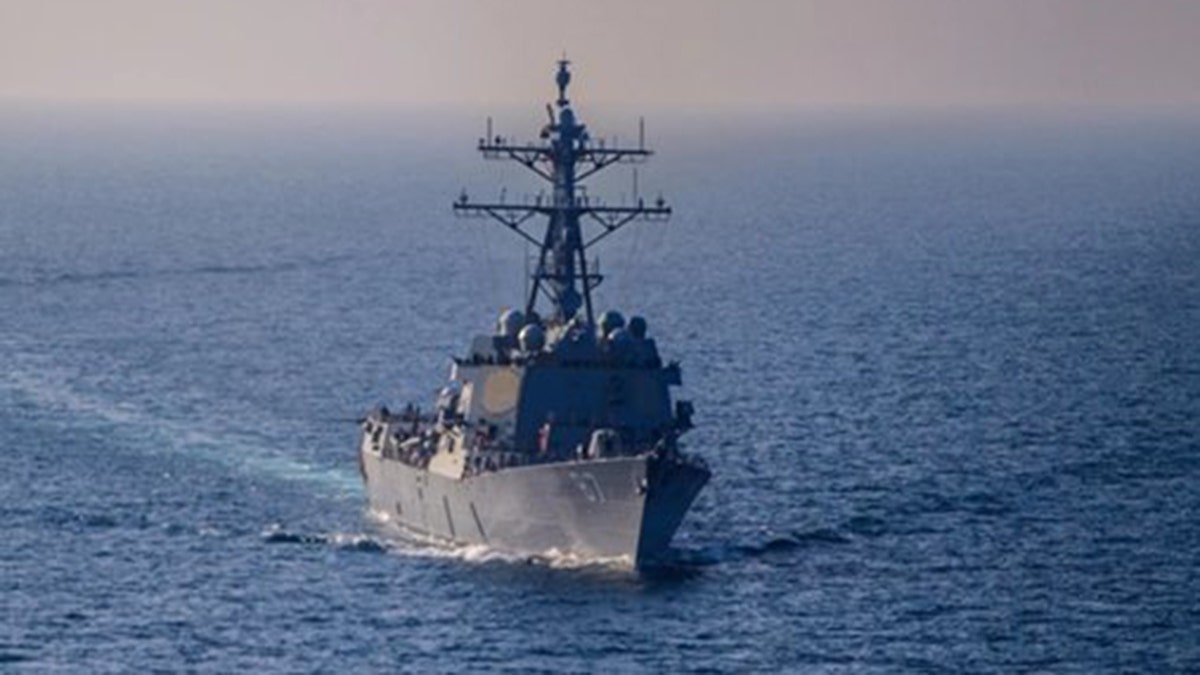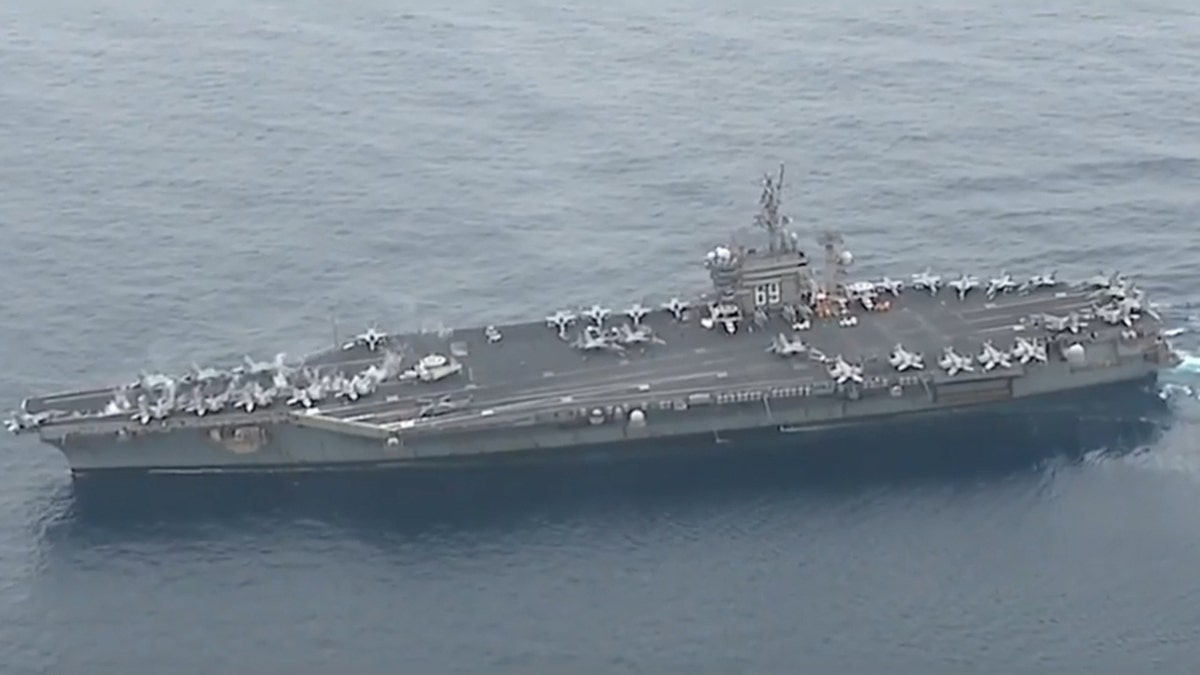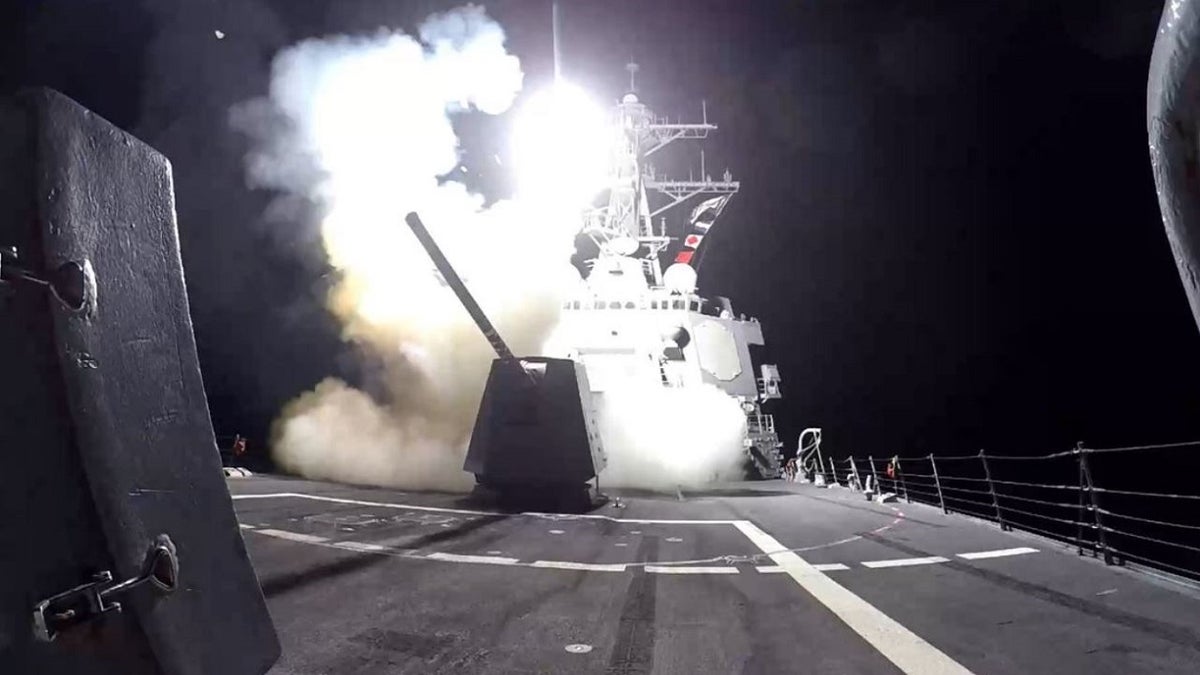The United States and United Kingdom carried out more than a dozen strikes against Iranian-backed Houthi targets in Yemen on Saturday, with support from Australia, Bahrain, Canada, Denmark, the Netherlands and New Zealand, two U.S. officials told Fox News.
The targets were hit successfully and include weapons storage facilities, and drone and missile launchers.
The operation hit five Houthi-controlled locations in Yemen and is a response to the near-daily Houthi attacks involving Iranian drones and anti-ship ballistic missiles, a senior U.S. official said.
The fourth round of American and British strikes came days after a British cargo ship was hit by a Houthi missile.
In a joint statement, the U.S, U.K. and the other allied countries said: «In response to the Houthis’ continued attacks against commercial and naval vessels transiting the Red Sea and surrounding waterways, today the militaries of the United States and United Kingdom, with support from Australia, Bahrain, Canada, Denmark, the Netherlands, and New Zealand, conducted an additional round of strikes against several targets in Houthi-controlled areas of Yemen.»
HOUTHI REVELS’ ATTACK SEVERELY DAMAGES A BELIZE-FLAGGED SHIP IN KEY STRAIT LEADING TO THE RED SEA

The USS Mason shot down an anti-ship ballistic missile launched into the Gulf of Aden on Saturday, the U.S. Central Command said. (U.S. Central Command / @CENTCOM on X)
The statement called the strikes «proportionate,» adding that they «specifically targeted 18 Houthi targets across 8 locations in Yemen associated with Houthi underground weapons storage facilities, missile storage facilities, one-way attack unmanned aerial systems, air defense systems, radars, and a helicopter. These precision strikes are intended to disrupt and degrade the capabilities that the Houthis use to threaten global trade, naval vessels, and the lives of innocent mariners in one of the world’s most critical waterways.»
The statement added, «These strikes are in response to Houthis’ continued attacks against commercial and naval vessels that have not only endangered international seafarers but the lives of the Yemeni people, including the February 22 missile attack that struck the United Kingdom-owned M/V Islander and injured a crewmember, the February 19 missile attack that nearly struck the U.S.-owned M/V Sea Champion while delivering humanitarian aid to Yemen, the February 19 UAV attack that struck the U.S.-owned M/V Navis Fortuna, and the February 18 missile attack that struck the United Kingdom-owned M/V Rubymar and forced the crew to abandon the ship.»
PENTAGON CHALLENGED ON NOTION US STRIKES ARE DETERRING HOUTHIS ATTACKS
It said that the Houthis have launched more than 45 attacks on commercial and naval vessels since mid-November that «constitute a threat to the global economy, as well as regional security and stability, and demand an international response. Our coalition of likeminded countries remains committed to protecting freedom of navigation and international commerce and holding the Houthis accountable for their illegal and unjustifiable attacks on commercial shipping and naval vessels.»
The countries said their aim was to «de-escalate tensions and restore stability in the Red Sea, but we will once again reiterate our warning to Houthi leadership: we will not hesitate to continue to defend lives and the free flow of commerce in the face of continued threats.»

USS Dwight D. Eisenhower in the Red Sea. (Fox News)
The strikes were carried out with F-18’s from the USS Eisenhower, according to two U.S. defense officials.
An assessment of any casualties is ongoing. Two U.S. defense officials said a very low number is expected, if any.
Defense Secretary Lloyd Austin also put out a statement that said: «Today, the militaries of the United States and the United Kingdom, with support from Australia, Bahrain, Canada, Denmark, the Netherlands, and New Zealand, conducted strikes against military targets in Houthi-controlled areas in Yemen. Coalition forces targeted eight locations, which included Houthi underground weapons storage facilities, missile storage facilities, one-way attack unmanned aerial systems, air defense systems, radars, and a helicopter, to further disrupt and degrade the capabilities of the Iranian-backed Houthi militia to conduct their destabilizing and reckless attacks against U.S. and international vessels lawfully transiting the Red Sea, the Bab AI-Mandeb Strait, and the Gulf of Aden.»
US COALITION FORCES DESTORY 6 HOUTHI ONE-WAY ATTACK DRONES
He said the «United States will not hesitate to take action, as needed, to defend lives and the free flow of commerce in one of the world’s most critical waterways. We will continue to make clear to the Houthis that they will bear the consequences if they do not stop their illegal attacks, which harm Middle Eastern economies, cause environmental damage, and disrupt the delivery of humanitarian aid to Yemen and other countries.»
The U.S. Central Command said in a statement: «On Feb. 24 at 5 p.m. (Sanaa time), USS Mason (DDG 87) shot down one Anti-Ship Ballistic Missile (ASBM) launched into the Gulf of Aden from Iranian-backed Houthi controlled areas of Yemen. The missile was likely targeting MV Torm Thor, a U.S.-Flagged, owned, and operated chemical/oil tanker. Neither USS Mason nor MV Torm Thor were damaged and there were no injuries.»
The U.K. Ministry of Defence said that four Royal Air Force Typhoon FGR4s, supported by two Voyager tankers, again participated in a «deliberate coalition strike» against Houthi targets.
«Intelligence analysis had successfully identified several very long-range drones, used by the Houthis for both reconnaissance and attack missions, at a former surface-to-air missile battery site several miles north-east of Sanaa,» the ministry said. «Our aircraft used Paveway IV precision guided bombs against the drones and their launchers, notwithstanding the Houthis’ use of the old missile battery revetments to try to protect the drones.»

A missile is launched from a warship during the U.S.-led coalition operation against Yemen’s Houthi rebels in earlier this month. (U.S. Central Command)
The ministry said that previous RAF strikes on Jan. 11 and Feb. 3 had already «successfully destroyed a number of buildings used to support drone and cruise missile operations at Bani, some fifteen miles west of Abbs airfield in north-western Yemen. Additional buildings at the Bani site had subsequently been confirmed as also being involved in the drone and missile activities there and were therefore targeted during this latest strike.»
The strikes come days after a British cargo ship was hit by a Houthi missile which Centcom is now calling an «environmental disaster» after an 18-mile oil slick was observed from space and the ship has been taking on water and is in danger of sinking. Over 40,000 tons of fertilizer is onboard.
Earlier this week, a U.S.-owned cargo ship was also hit by a missile.
U.S. and British forces launched their first round of strikes Jan. 11, but the attacks against commercial shipping at sea have continued.
CLICK HERE TO GET THE FOX NEWS APP
British forces have been using Tornado strike fighters launching from the island of Cyprus in the Mediterranean. U.S. jets came from the flight deck of the USS Dwight D. Eisenhower. U.S. warships have also launched Tomahawk cruise missiles against targets in Yemen.
British warships in the Red Sea have no ability to launch strikes into Yemen. Royal Navy destroyers and frigates cannot launch missiles against land targets.
Both British and French warships have destroyed drones in the air in recent weeks.

